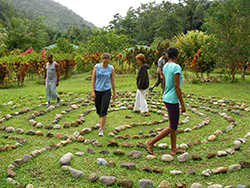And now for a more "up close and personal" answer to Erica's question (on the About page of this blog)...
Erica asked about my philosophy of life, and my dilemma is that I don't really have one in terms of having a set of fixed beliefs. At the same time, it's fair to say that I've spent a good deal of my life philosophizing. After taking a vocational aptitude test in college, my advisor scratched his head and said, "this indicates that you'd do best at being an armchair philosopher". I love to think about the nature of life and look at things from all sorts of angles. I love to question things. I've also had a love of asking the question "why" which doesn't really have an answer, and I suppose much of my journey has been to give up the need to know answers and to be able to embrace lovingly what is here in this incredible play of life, with all its contradictions and paradoxes, and with all its joy and pain.
So it's difficult to say what my philosophy is, but I can say something about what's behind my guided meditations. Behind them is a quest, a quest for greater acceptance, peace and to be more fully alive. My guided meditations are as much for me as for those who listen to them. It's not like have a specific philosophy to share. It's more like I see us all on a journey together. Along the way on my journey I started meditating, then teaching meditation and eventually leading guided meditations. It's in my nature to communicate and share what I learn and experience.
When I create a guided meditation, I close my eyes and drop into a meditative state and see what comes. I am literally meditating with you, and the meditations speak to me in the same way they speak to those of you who enjoy them. What they speak about for me is trust in the natural flow of life and relaxing into that. For want of a better way to describe it, I view life as a flow of energy, much like a river. That flow is governed by the same natural laws as those that move the river along its path. Everything that we do and experience is a part of that flow. Events are a part of that flow, as are our reactions to those events and all of the thoughts and emotions that arise within us. My path has been one of developing trust in that flow. Relaxation is a reflection of that trust.
Some of the guided meditations I lead are simply about that -- about relaxing into life as it naturally unfolds. The Relaxation Break, Simply Being, Effortlessness and Letting Go are examples of that kind of meditation. When I first started leading guided meditations, I thought that was all that I would do, because that is the kind of meditation I had always taught. But things evolved and I found it was useful to sometimes direct the attention in ways that helped to create balance and enhance fulfillment in life.
So there are meditations about healing, the chakras, nature, etc. I enjoy the process of creating these new meditations, and a lot of this is happening thanks to the podcast and the requests and feedback I receive. I decided not to restrict myself to just one kind of meditation. All the other meditations, however, are based on starting with a relaxed, open state of awareness. That's why they all start out in much the same way. Then the meditations that have a specific focus will be much more effective if one starts with that non-resistant, going with the flow, state of awareness. If we are tense and fighting with what's happening within us (or noise or something going on around us), then all our energy goes to that and we can't direct our attention in other ways.
As for my background, it's been very eclectic. At first I learned and taught meditation in a style from India. I was trained in a very specific technique and the essence of that technique was effortlessness. This had a great deal of influence on me. After years on one path, however, I began to study with some other teachers and learned other practices and was exposed to a number of philosophies. I also studied and taught energy healing for a number of years and that too has shaped my meditations. I also worked as a counselor in mental health and hospice, and the insights and understanding I gained from that certainly influence the meditations I create.
I'd have to say that my guided meditations today are a synthesis of all of these different influences. Of course, this synthesis is unique because I am a unique individual just as we all are. Ultimately, everything that has happened in my life contributes to the meditations, because everything in life is a teacher.
It's interesting that people often recognize their paths in my work. Erica asked about whether I have a background in Buddhist Vapassana meditation and I don't, although often people have found that in my work. People have also found similarities to Christian centering meditations and other traditions. I think that’s because the same principles and concepts are arrived on many different paths.
Often as I am creating a meditation, I am surprised at what comes out. It will not be quite like anything I've heard before. That's part of the fun of it, and part of the reason I don't relate too much to tradition and what's gone before. What's really alive is what is fresh in this moment, in the infinite creativity of the life force as it expresses itself here and now.



